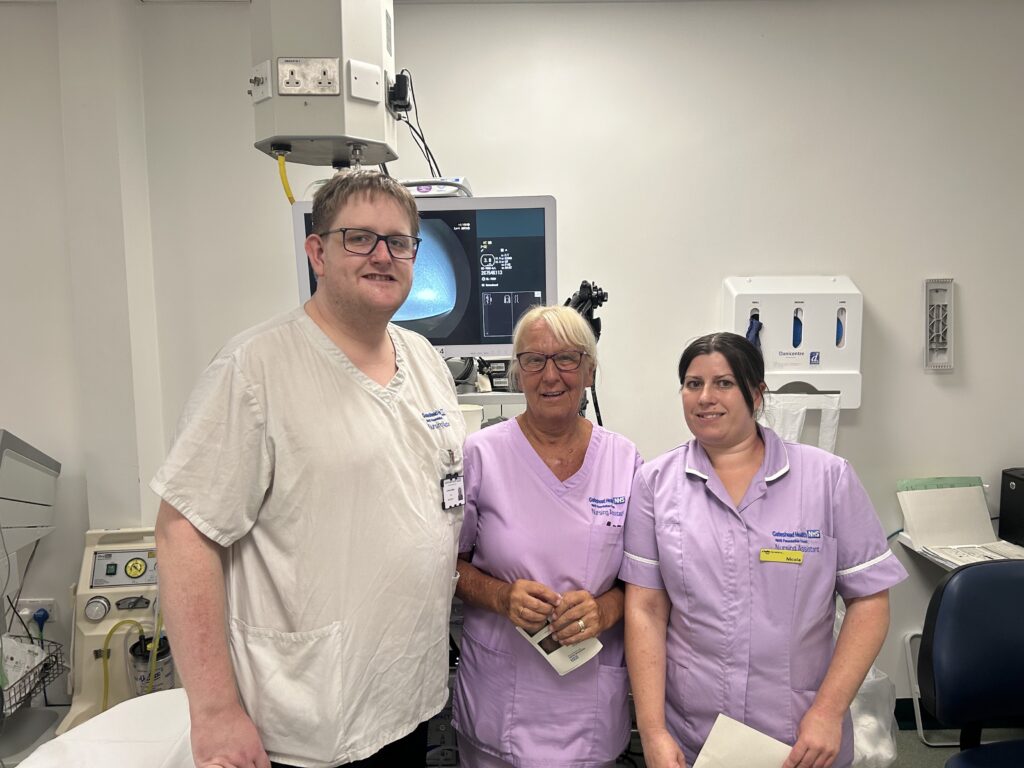Health care assistants (HCAs) are an important part of the endoscopy team at Gateshead Health NHS Foundation Trust.
Endoscopy is a medical procedure used to diagnose and treat various conditions by inserting a flexible tube with a camera (endoscope) into the body. It allows doctors to see the internal organs and tissues, making it an invaluable tool in diagnosing and treating a wide range of medical issues, from gastrointestinal problems to respiratory conditions.
The department supports a range of procedures that include gastroscopy, colonoscopy, flexible sigmoid scope, bronchoscopy, flexible cystoscopy, and more. The HCAs ensure that these procedures run smoothly and patients receive the best possible care. One HCA said. “I love the daily interaction with patients and meeting different people. Working in the endoscopy unit can be challenging, fascinating, and rewarding all at the same time.”

Working as an HCA in endoscopy is a highly skilled role, the team is in charge of making sure that all machinery is working correctly as well as setting up all endoscopes. This requires a high level of understanding of different equipment.
On a day-to-day basis, the team has up to five patient lists to work through in the morning, afternoon, and twice a week in the evening. This ranges from inpatient and outpatient appointments which means the department can get very busy. The health care assistant supports the clinical team by managing the capacity of the department, dealing with patient documentation, and recording patient observations.
The role involves taking biopsy’s and polyps which require focus and organisation to listen to the endoscopist’s instructions. This involves training and development which is supported by the management team. One HCA said, “The management team is very supportive if you are interested in learning more about the field and would like a challenge.”
Working within the ERCP (endoscopic retagrade cholangio pouncreatongraphy) is a huge part of working in the endoscopy department. This procedure uses an x-ray to diagnose and treat illness in the liver, gallbladder, and bile ducts. It is rewarding for the HCAs to observe the procedure and be part of the wider team.
Thank you to all of our health care assistants for your invaluable contribution to our endoscopy department and Gateshead Health.
Useful definitions
- Gastroscopy – a test where a thin flexible tube (endoscope) with a small video camera at the end is passed through the mouth to look inside your throat, food pipe (oesophagus) and stomach.
- Colonoscopy – a test where a long, thin, flexible tube with a small camera inside it is passed into your bottom to look inside your rectum and bowels (colon).
- Flexible sigmoid scope – a partial colonoscopy. The test uses a flexible, narrow tube with a light and tiny camera on one end, called a sigmoidoscope, to look inside your bottom (rectum) and bowels (lower colon).
- Bronchoscopy – a test where a thin tube (bronchoscope) is passed through your nose or mouth to look at your air passages and lungs.
- Flexible cystoscopy – a test where a thin and bendy viewing tube (cystoscope) is passed along the urethra (the tube that carries pee out of the body) to look into the bladder.
- Biopsy – removing a piece of tissue or a sample of cells from your body so that it can be looked at under a microscope or tested in a laboratory
- Polyps – small growths on the lining of the inside of your body, such as in the bowels, uterus, nose or ear canal.
- Endoscopic retrograde cholangio pouncreatongraphy – a test that uses both X-ray and endoscopy to diagnose and treat problems with your biliary system (organs and tubes that produce, store and transport a fluid called bile.